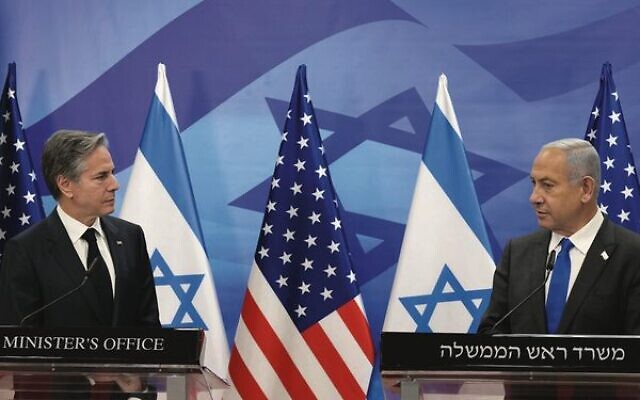Blinken makes US concerns over judicial shake-up clear
Secretary of State visits Israel, West Bank

Speaking in Jerusalem this week alongside Israeli Prime Minister Benjamin Netanyahu, US Secretary of State Antony Blinken placed a noticeable emphasis on the democratic values shared by the two countries, a clear sign that the White House is concerned over judicial overhaul plans by Israel’s new right-wing government.
“Throughout the relationship between our countries, what we come back to time and again is that it is rooted both in shared interests and in shared values,” said Blinken.
“That includes our support for core democratic principles and institutions, including respect for human rights, the equal administration of justice for all, the equal rights of minority groups, the rule of law, free press, a robust civil society – and the vibrancy of Israel’s civil society has been on full display of late.”
Netanyahu stressed that Israel and the US “share common values; two strong democracies which will remain, I assure you, two strong democracies”.
Focusing the conversation on Tehran, he told Blinken the international community had seen “the true face of Iran”.
“They’ve seen the barbarism of this regime against its own people,” said Netanyahu, referring to the months-long protests in Iran. “They’ve seen how it exports aggression beyond its border and beyond the Middle East, and I think there is a common consensus that this regime must not acquire nuclear weapons.”
Blinken also spoke about stopping Iran from acquiring a nuclear weapon, but moved quickly to the drones Iran is providing to Moscow.
He also obliquely urged Israel to expand its support for Kyiv, saying, “Russia’s ongoing atrocities only underscore the importance of providing support for all of Ukraine’s needs – humanitarian, economic and security.”
Both men spoke about Israeli–Palestinian relations. After expounding on the importance of helping Israel integrate into the region and expand the Abraham Accords, Blinken emphasised that “these efforts are not a substitute for progress between Israelis and Palestinians”.
Blinken arrived in the region days after a Palestinian terrorist killed seven people outside a synagogue in a Jerusalem neighbourhood, and another attack that seriously injured two. He strongly condemned the attacks in every statement he made in Israel.
In Ramallah, Blinken expressed his sorrow for the “innocent Palestinian civilians” killed over the past year in the West Bank, after meeting Palestinian Authority President Mahmoud Abbas.
He also condemned Palestinians “who celebrate … acts of terrorism that take innocent lives”, in the wake of Friday’s deadly shooting, the deadliest terror attack against Israelis in over a decade.
Abbas told Blinken that Israel is responsible for the recent uptick in violence – including the shooting in Jerusalem that killed seven people, carried out by a Palestinian from East Jerusalem – highlighting Israeli “policies that undermine a two-state solution”.
The Palestinian leader also lamented what he said was a lack of effort in the international community to hold the Israeli government accountable, claiming it has enabled continued settlement expansion, land expropriation, settler violence, IDF raids into Palestinian towns, home demolitions and evictions.
Blinken told Abbas in front of reporters that the US will continue to oppose such steps by Israel in the West Bank and East Jerusalem.
In a press conference in Jerusalem after returning from Ramallah, Blinken said restoring calm between Israelis and Palestinians is “the immediate task”, but Washington would keep working toward a two-state solution.
“The United States will continue to oppose anything that puts that goal further from reach,” he said in prepared remarks, “including but not limited to settlement expansion, legalisation of illegal outposts, moves toward annexation of the West Bank, disruptions to the historic status quo at Jerusalem’s holy sites, demolitions and evictions, and incitement and acquiescence to violence.
“All sides must take steps to prevent further escalation of violence and restore calm.”
Times of Israel

comments